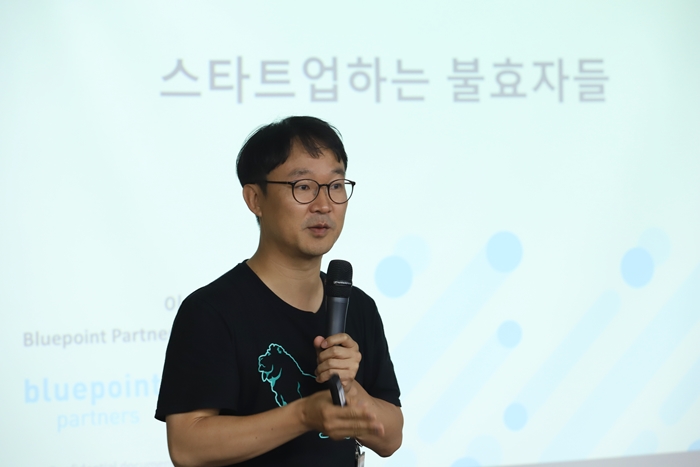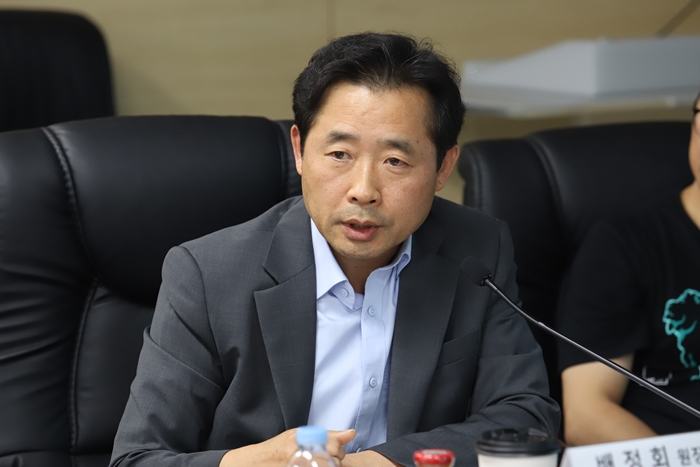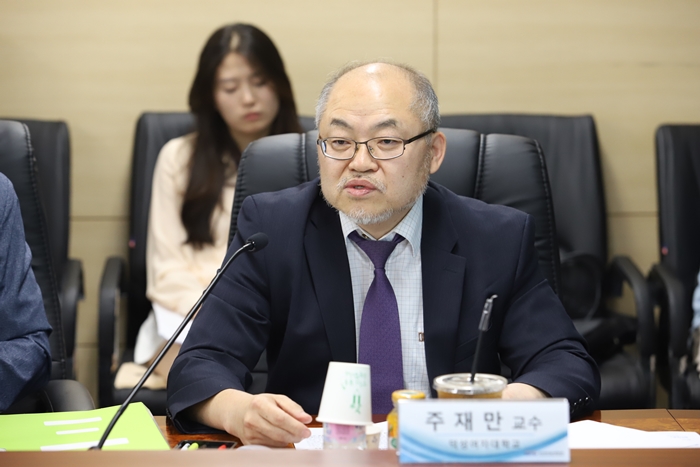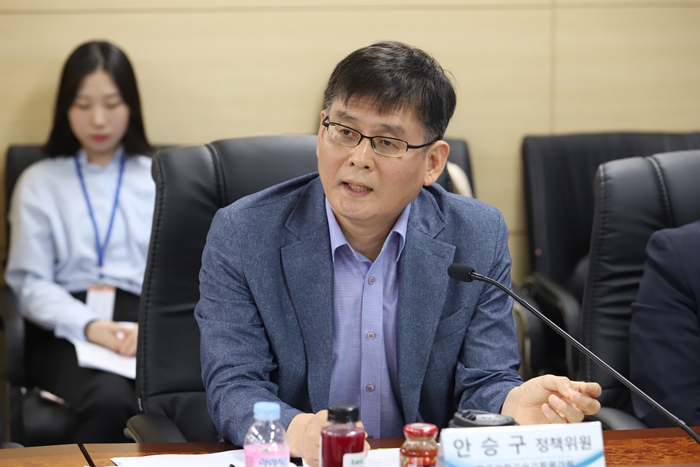
News & Event
News & Event
[The 111th Wednesday Forum] The Path of Start-ups in Science and Technology: Start-up Inferiors
- Writer Yeory Lim
- Date2019-09-19
- Hit968
KISTEP held the 111th Wednesday Forum with the theme of ‘The Path of Start-up in Science and Technology: Start-up Inferiors’ on September 18th (Wed), 2019.
Along with the recent growth of mobile platforms, new business opportunities are generated using new ICT technologies, and the fever of starting new businesses in relative areas are spreading all over the world. The representatives of start-up companies are Uber, Airbnb, and Snapchat, and they have grown to unicorn companies that valued at over a billion dollars. In line with the trend, the government of Korea selected ‘Start-up and innovative growth led by small- and medium-sized venture companies’ as a major national agenda in the economic sector, then presented plans for creating start-up environment based on science and technology, and for boosting investment for it. But the persistence of start-up companies is threatened by the way the society looks at them and by various risk factors. Therefore this forum was prepared to share the supporting system for start-ups in science and technology and its actual cases, and to seek policy options to promote start-ups in science and technology.

▲ Sang-seon Kim (President, KISTEP)
The forum began with the opening address by Sang-seon Kim (President of KISTEP) and followed by the presentations of Yongkwan Lee (CEO, Bluepoint partners). Panel discussion were led by Junghoi Bae (Director, Commercializations Promotion Agency for R&D Outcomes), Jaeman Joo (Professor, Duksung Women’s University), and Seung-ku Ahn (Policy advisor, Research Institute of S&T Innovation and Strategy, KISTEP) and open floor discussion followed.

▲ Yongkwan Lee (CEO, Bluepoint partners)
Firstly, CEO Yongkwan Lee explained the differences between ‘Venture company’ and ‘Start-up company.’ Then he asserted that “Previously, venture companies got investment easily because they supplied components and equipments that large companies needed so the large companies became their concrete customers. These days, however, business models depending on large companies are hard to get large profits.” He added that “On the other hand, start-up companies are independent, can reach global markets by itself, and can monopoly even a very small area.” He summarized that “In the past, the purpose of start-ups was making a big fortune bearing high risks, now start-ups are considered as a way to change the world to a better place. Taken Eric Ries’ words, a start-up company can be demonstrated as ▲a man-made organization, ▲in extremely uncertain circumstances, ▲to produce new products or services.”
Then Mr. Lee continued on the natures of start-up founders. A start-up is a reasonable adventure from the calculation that new markets starting from zero-base are more beneficial than already-existing markets surrounded by large companies and other competitors. A start-up founder is an experimenter who continually experiments and modifies hypotheses to find new products and services that would work for new markets, and an innovator who is willing to make the better world. Moreover, for the way the society looks at ‘adventures,’ he mentioned that “Start-ups are not welcomed and people are gathered to get stable jobs, a society not-tolerating failures causes inevitable competitions and waste of human resources.
When starting up a new company, he pointed out ‘Product market fitting’ to be the most important and the first thing to do, and added that “When finding problems, how bad they are in the society and to whom they can be problematic should be verified.” He emphasized that the problems are to be ‘found,’ not ‘created’ by founders. Also, you need to see if prepared solutions can actually solve the problems, if not, it is very important to see if you have courage to revise the entire solutions. It is essential for a company to consider which market to enter and scale up, and if a team is timely constituted for problems that the company is confronting. Lastly, he cited Will Smith’s ‘God placed the best things in life on the other side of terror,’ and asked for start-up founders not to be intimidated and to dare for adventures.

▲ Junghoi Bae (Director, Commercializations Promotion Agency for R&D Outcomes)
In panel discussion, director Bae said that “According to statistics, only 10 percents of 200 companies that started from last year were start-ups based on science and technology, and only a small percentage of them were based on technologies from universities and research institutes,” and explained that invested R&D performances are not shown as starting up new companies. Director Bae pointed out the factors interfering start-ups of technologies as ▲problems in platform, ▲problems in human resources, and ▲financial problems. He emphasized that “Many successful start-up companies invested vast amount of time and money in developing platforms. If technologies for platform development are supported, start-ups can be much easier.” He suggested that “It is hard for researchers to be good at running business as well, so a system, where private businessmen can easily reach technologies of universities and government funded research institutes, should be prepared to help external innovators start up new businesses.” Lastly, he added that means to cut down the cost of the process before and after start-ups should be prepared, besides of direct financial supports.

▲ Jaeman Joo (Professor, Duksung Women’s University)
Professor Joo mentioned that “The types of start-ups can be categorized into a technology-led type, a market-centered type, and a hybrid type. It is necessary to improve the fact that majority of start-ups of national universities and research institutes are the technology-led type without market understanding.” Also he claimed that “It is more important to know what the natures of problems are, and what aspects to observe them rather than finding problems to solve.” Then he added that “When planning a research, thorough investigation on whether the technology is useful in markets should be done.” It is required to create a culture that businessmen with a background of science and engineering can share their know-how in business, and to support the weak sections such as financial analysis and business feasibility evaluations for businessmen with the similar background. Lastly, he suggested that “Methods should be sophisticated for research results to be expressed as financial ones, and the society should tolerate to failures and adventures as the trend is shifting from start-ups for living to start-ups for opportunities.”

▲ Seung-ku Ahn (Policy advisor, Research Institute of S&T Innovation and Strategy, KISTEP)
Lastly, policy advisor Ahn emphasized that the government should comprehend and eliminate the difficulties that start-ups are suffering from to save start-up founders from being inferiors. He clarified the difficulties as ▲human resources, ▲fund raising, and ▲the lack of knowledge in business management, and explained that “The major problem of them is the human resources. The working condition of start-ups is poor compared to that of large companies, it causes difficulties in recruitment and frequent early resignation, and it is more distinct in companies based in regions.” He stressed the difficulties in the fund raising for R&D and business management of start-up companies saying that “There are cases that banks reject secured loans of start-ups which are guaranteed by governmental institutes, and this shows the gap between the investing ecosystem that the government built and the actual financial environment.” He added that “It is common for start-ups to lack in necessary knowledge for business management such as accounting, human resources, and financial management, and to have limited funds to get a consulting for them.” To solve these issues, the government should support personnel expenses to start-up companies to provide better working condition, and provide research funds and packaged supports integrated with funds for management if necessary. Also he emphasized that it is required to educate technology founders about the product-market fitting methods, not just start-up training, and to provide educational training necessary for business management in various perspectives.
